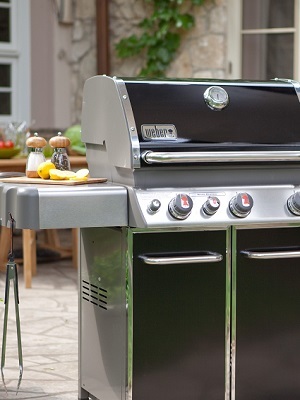The makers of the iconic Weber backyard grill may get their chance to prove at trial Sears intentionally aped the Weber design for its own store-brand grills, after a federal judge said there may be more than just smoke to Weber’s infringement claims against the retailer.
Palatine-based Weber-Stephen Products, creator of the eponymous Weber Grill, filed suit in federal court in 2013 against Sears Holding Corp. and Sears, Roebuck & Co., alleging some of Sears’ Kenmore grills infringe on Weber’s so-called “trade dress,” or the specific design and appearance of its products. Sears had sold Weber grills alongside its own Kenmore grills in its stores, until Weber stopped supplying Sears in 2012.
Sears sought summary judgment, arguing Weber can’t prove a key element of its claim — secondary meaning. As U.S. District Judge Edmond E. Chang wrote in his opinion, delivered Sept. 1, “trade dress has secondary meaning if the public associates the trade dress with a specific manufacturer. If, for example, the public looks at Weber’s trade dress and thinks, reflexively, ‘this grill must be a Weber,’ then the trade dress has secondary meaning.”
Chang said it makes sense for Weber to include this element in its infringement claim because “trademark law exists to prevent consumer confusion about who made which goods.” Weber said it spent $59 million in advertising and has sold at least 1.4 million of the grill models in question from 2007 to 2012, and Chang acknowledged anecdotal evidence the public made a connection between Weber and its trade dress.
More importantly, however, are “emails and other documents showing that Sears intentionally copied Weber’s trade dress. According to an email authored by a Sears product manager, Sears designed its Kenmore Elite grills hoping that consumers would look at them and ‘think of the market share leader, Weber.’ … Copying like this is strong evidence of secondary meaning because the only reason that Sears would have expected copying Weber to make consumers think of Weber is if, in fact, Sears believed that Weber’s trade dress had acquired secondary meaning. This copying evidence, taken together with Weber’s other evidence, is enough to warrant a trial.”
The grills at the root of the claim are the Genesis and Summit gas grill lines, which Weber introduced in 2007 after an expensive and lengthy redesign process. The distinctive components figuring in the lawsuit are metal bands on the edges of the grill shroud with exposed rivets, shiny door edges on the grill cart, shiny horizontal tubular door and lid handles and a product logo on a corner of the side table.
Weber contends the Genesis and Summit grills were the only grills sold and promoted with these distinctive elements — and were sold in Sears stores — until similar Kenmore products entered the market in 2012. Weber supplied evidence showing that, once the Kenmore grills were available, at least one consumer bought a Kenmore grill thinking, because of its appearance, it was a Weber Genesis. Likewise, a retailer called Weber to complain because they thought Weber was manufacturing the Kenmore grills under a private label agreement for Sears.
Chang detailed the “substantial evidence that the purpose of Sears’ copying was to pass off the Kenmore grills as Weber-made” and denied Sears’ request for summary judgment: “Relying on the proffered evidence, a reasonable jury could conclude that Weber’s trade dress acquired secondary meaning.”
Further, Chang deconstructs Sears’ summary judgment request in several areas, including misplaced reliance on preceding cases, improper accusation of discovery violations and ignoring “basic tenets of summary judgment practice.” His ruling allows the case to proceed to a trial. He also denied a Weber motion to strike a piece of evidence.
Sears has been represented in the case by attorneys from the firms of Partridge & Garcia P.C., of Chicago; Kelley Drye & Warren LLP, with offices in Chicago and Washington, D.C.; Chuhak & Tecson P.C, of Chicago; Morgan Lewis & Bockius, of Chicago; and Greenberg Traurig LLP, of Chicago.
Weber has been represented in its action by the firms of Niro, McAndrews, Dowell & Grossman LLC, of Chicago; Hogan Lovells US LLP; Niro, Scavone, Haller & Niro, of Chicago; Lee Sheikh Megley & Haan, of Chicago; and Dowell IP, of Chicago.
